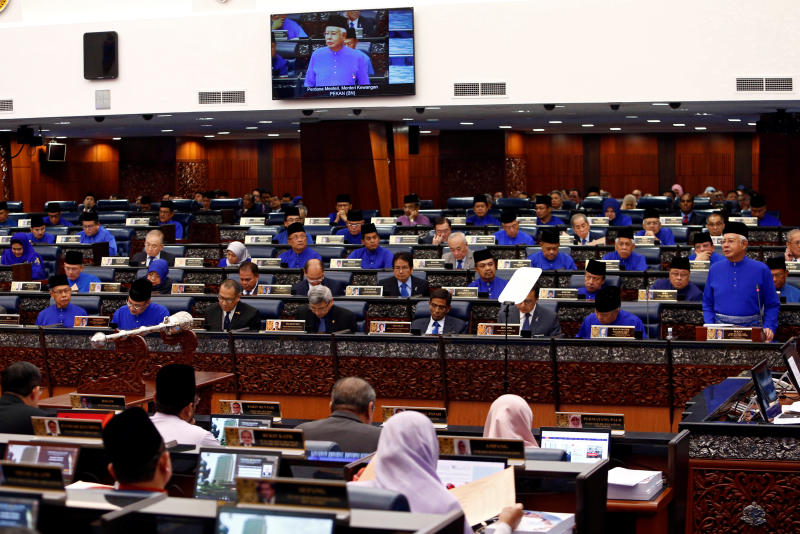Malaysia Parliament set to make two key changes seen favouring ruling BN coalition before polls
Sign up now: Get insights on the biggest stories in Malaysia

Malaysia's Prime Minister Najib Razak presents the 2018 budget at the parliament house in Kuala Lumpur, on Oct 27, 2017.
PHOTO: REUTERS
Follow topic:
KUALA LUMPUR - Malaysia is set to make key changes in a final parliamentary session that starts Monday (March 5), which critics say will help the ruling Barisan Nasional (BN) coalition win an impending general election.
The BN government has been accelerating the approval of these two key efforts in the last few weeks ahead of the month-long session that will be opened by the Malaysian King.
One of them is the drawing up of new electoral boundaries, known as redelineation, that analysts say would move in pro-BN voters into marginal constituencies, while packing opposition supporters into wards that are considered lost causes for the ruling pact.
"The redrawing of the borders is the ultimate weapon by BN to shift support, in particular Malay voters," said Universiti Malaya's Prof Awang Azman Awang Pawi, referring to the majority community which has largely backed BN in the past.
The second change that the government wants to push through is the "fake news" legislation that the opposition believes will be used selectively to weaken its election campaign.
The 13-party BN coalition led by Umno can easily pass the two pieces of legislation due to its comfortable majority in parliament.
Analysts estimate that the extensive changes to electoral boundaries - affecting more than half of all constituencies - would deliver BN 10 more federal seats.
The voting maps were last changed nationwide in 2003, when BN was also accused of making the changes to its advantage.
Recent court decisions have cleared the way for the Election Commission (EC), a unit under the Prime Minister's Department, to finalise the new maps for national polls, expected to be held in May.
The commission completed a final step last week before putting the boundary changes to a vote in Parliament after hearing out objections in Selangor - the last state to see proposed new boundaries.
The EC has ignored more than 80 per cent of the 250 objections in the state, its critics say, but it has rushed to hear the objections put up by others with hearings that went on to 8pm.
Electoral reform group Bersih has accused the EC of bulldozing through the process. Bersih chief Maria Chin Abdullah said "although the EC has until September 2018 to complete the process, it is obvious that they want to get this passed before the general elections."
But Umno information chief Annuar Musa has dismissed claims the new maps favour BN, pointing out that "voters make different decisions at different times. So if you say delineation of boundaries will bring out certain result, that's only an assumption".
Analysts say the new electoral maps proposed will allow BN to remain in power even if it brings home less than the 47.3 per cent of votes won in 2013. Combined, the opposition won 50.9 per cent of the vote. But despite losing the popular majority for the first time, BN still maintained control of 60 per cent of Parliament and nine out of 12 state governments contested.
Moreover, possible changes to Selangor could see BN's chances enhanced in Malaysia's richest state, a prize that Prime Minister Najib Razak's Umno has coveted the past decade.
The second piece of legislation, on "fake news", will impose higher fines and jail terms.
The fake news committee was only announced on Jan 30, but de-facto Law Minister Azalina Othman Said has said the government wants to table new legislation before Parliament closes on April 5.
Online watchdog, the Malaysian Communications and Multimedia Commission, has proposed that fake news be punishable with fines of up to RM500,000 and 10 years in jail. This is 10 times the limit for transmitting data deemed "offensive" and a possible "annoyance", a clause which has already been criticised for stifling free speech.
"The fake news phenomenon must be combated but it must not be weaponised by the authorities... to harass and persecute legitimate political opponents," said opposition stalwart Lim Kit Siang.
Datuk Seri Azalina has said fake news is a threat to national security, and that the new law will protect everyone as "fake news affects the opposition" too.

